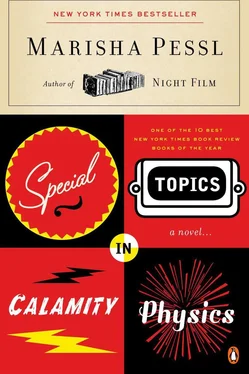Obviously, this surprised me. I didn’t have my flashlight and the wind was picking up; I was wearing nothing more substantial than jeans, a T-shirt, the sweatshirt Dad had given me from the University of Colorado at Picayune and a windbreaker. But she was already moving swiftly away, weaving in and out of the trees, and so, with a quick glance back at the others — they were laughing, their voices tightly woven together — I headed after her.
Out of earshot from the campground, I was going to ask what we were doing, but when I looked at her, I saw the focused, intense look on her face, and it silenced me. She removed a flashlight — she was wearing one of those fanny packs in black or dark blue, which I hadn’t noticed before — but that meek circle of white light could barely shove back the dark, illuminating nothing but a handful of skinny tree-shins.
We followed no path. At first I tried keeping a mental Hansel and Gretel trail of crumbs, noticing the irregularities — discoloration of bark, okay, giant toadlike rock next to that dead tree, skeleton branches stretched out in an upside-down crucifixion, that’s promising — but such distinctions were rare and ultimately pointless, and after five minutes, I stopped and walked blindly next to her, like a man no longer dog-paddling, allowing himself to drown.
“They’ll be fine for a little while,” she said. “But we don’t have much time.”
I don’t know how long we walked. (In what turned out to be an unbearable oversight, I was not wearing a watch.) After ten minutes or so, she stopped suddenly, and, unzipping the pouch around her waist, removed a map — different from the one she’d given us, colored, much more detailed — as well as a tiny compass. She studied them.
“A little farther,” she said.
We walked on.
It was odd, the blind way I followed, and even now, I can’t quite explain why I went, without protest or questions or even fear. During those episodes in one’s life in which one assumes one will be paralyzed with dread, one isn’t. I floated, as if I were doing nothing more than riding the mechanical brown canoe on the Enchanting Amazon River Ride at Walter’s Wonderworld in Alpaca, Maryland. I noticed peculiar details: Hannah chewing the inside of her lip (the way Dad did when grading an unexpectedly apt paper), the toe of my leather boot kicking the flashlight beam, the pine trees’ restless shifts and heaves, as if they were all unable to sleep, the way she placed her right hand, every minute or two, on that satchel clipped around her waist, like a pregnant woman touching her stomach.
She stopped walking and checked her watch.
“This is good,” she said, turning off the flashlight.
Slowly my eyes calibrated to the darkness. We appeared to be standing in a spot we’d walked through five minutes before. I could make out the fine corduroy of all those trees enveloping us, and Hannah’s rapt face, shiny, a sort of bluish mother-of-pearl.
“I’m going to tell you something,” she said, staring at me. She took a deep breath, exhaled, but said nothing. She was nervous, worried even. She swallowed, took another beleaguered breath, pressed her hand to her collarbone and left it there, a white, wilting hand-corsage. “I’m terrible at this. I’m good at other things. At math. Languages. Orders. Making people comfortable. I’m horrible at this.”
“At what?” I asked.
“Truth.” She laughed, a weird choking sound. She hunched up her shoulders and looked up at the sky. I looked too, because looking up at the sky was contagious, like yawns. There it was: hoisted into the air by the trees, a heavy black patch, the stars, little rhinestones like the ones in June Bug Rachel Groom’s cowboy boots.
“I can’t blame anyone, you know,” Hannah said. “Just myself. Everyone makes choices. God, I need a cigarette.”
“Are you okay?” I asked.
“No. Yes. ” She looked at me. “I’m sorry.”
“Maybe we should head back.”
“No, I–I understand if you think I’m nuts.”
“I don’t think you’re nuts,” I said, though as soon as I said it, of course, I began to wonder if she was.
“It’s not bad, what I have to tell you. More for me. Awful for me. Don’t think I don’t know how awful. How sick. Living like this — oh, you’re afraid. I’m sorry. I didn’t mean for it to be like this, deep in the enchanted forest, I know, it’s a little medieval. But it’d be impossible to talk without one of them coming up, Hannah this, Hannah that. Oh, God. It’s impossible.”
“What’s impossible?” I asked, though she didn’t seem to hear me. She appeared to be saying these things to herself.
“When I thought about how I was going to say it — God, I’m a coward. Deluded. Sick. Sick.” She shook her head, touched her hands to her eyes. “See, there are people. Fragile people, that you love and you hurt them, and I–I’m pathetic, aren’t I? Sick. I hate myself, I really do. I…”
In many ways, there is nothing more disturbing than an adult who reveals herself not to be an Adult and all that word is supposed to imply — not solid, but leaking, not fixed, but seriously unglued. It was like being in first grade again, watching some adorable hand puppet rising up, revealing the monstrous human attached. Her chin crinkled with strange unknown emotions. She wasn’t crying, but her dark mouth curled down at the edges.
“You’ll listen to what I say?” Her voice was low, quivery like a grandmother’s, but needy like a child’s. She stepped forward, a little too close to me, her black eyes swerving over my face.
“Hannah—?”
“Promise me.”
I stared at her. “Okay.”
This seemed to calm her slightly.
“Thank you.”
Again, she took a deep breath — but didn’t speak.
“Is this about my father?” I asked.
I wasn’t sure why, without thinking about it, that particular question flew out of my mouth. Maybe I hadn’t quite gotten over the revelation of Kitty: if Dad had lied so smoothly about her, it was entirely possible he’d lied about other clammy trysts with St. Gallway staff. Or perhaps it was a reflex; throughout my life, without explanation, teachers had pulled me aside in hallways and lunchrooms, by cubbyholes and jungle gyms, and as I hyperventilated, waited to hear I’d been bad, would be harshly punished, that I’d botched a Unit Test and would be held back a year, they always surprised me by leaning in with their grayed eyes and coffee breaths and asking me inane questions about Dad (Did he smoke? Was he single? / When’s a good time to call and mingle?). Frankly, if I was to form a hypothesis for such cases of being bizarrely singled out, it’d be: It All Comes Down to Dad. (Even he upheld this premise; if a supermarket check-out person was sullen, Dad concluded it was because of the condescending way Dad had accidentally looked at him while piling our groceries on the conveyor belt.)
I couldn’t gauge Hannah’s reaction, however. She stared at the ground, her mouth open a little, as if in shock, or perhaps she hadn’t heard me and was trying to think of something to say. And as we stood in that endless carbonated fizz of trees and I waited for her to respond with “Yes,” or “No,” or “Don’t be crazy”—a few yards behind us, there was a small but distinct shift of something.
My heart lurched. Instantly, Hannah switched on the flashlight, pointing it in the direction of the noise, and to my horror, the light actually snagged something — a reflection of some kind, a pair of glasses — and then it began crashing away from us, barging through the branches and bushes and pine needles and leaves on what was, indisputably, two feet. I was too horrified to move or scream, but Hannah clamped a hand over my mouth and held it there until we couldn’t hear it anymore, until there was only the stark night and the sound of the wind shivering in the trees.
Читать дальше












